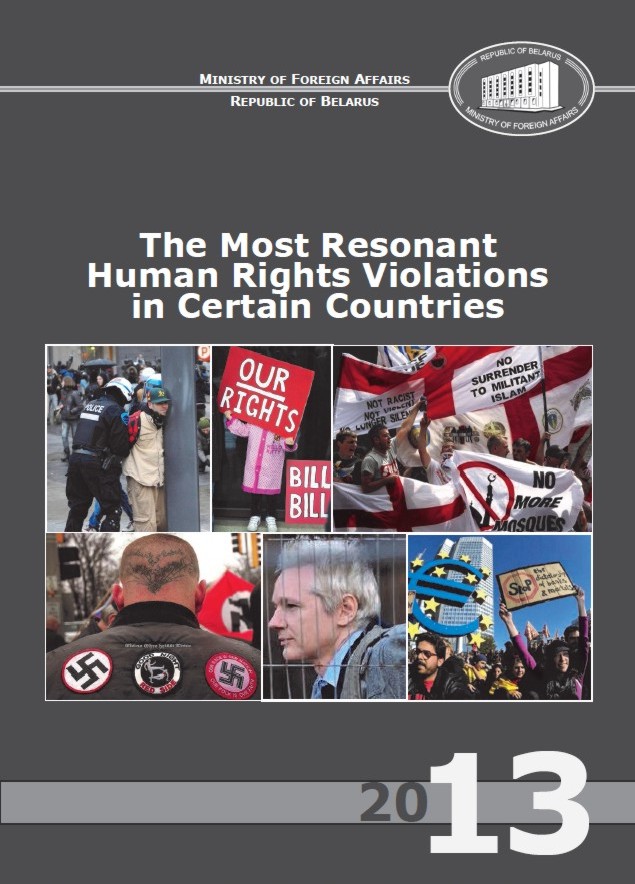MFA report “The Most Resonant Human Rights Violations in Certain Countries 2013”
 This is the second report on the most resonant human rights violations in certain countries issued by the Ministry of Foreign Affairs. It was written on the basis of various sources, like the results of Human Rights Council’s UPRs, observations of the HRC’s special thematic procedures and the UN treaty bodies, information of international, regional, and national governmental and non-governmental organizations, as well as data collected from open sources by the diplomatic missions of Belarus.
This is the second report on the most resonant human rights violations in certain countries issued by the Ministry of Foreign Affairs. It was written on the basis of various sources, like the results of Human Rights Council’s UPRs, observations of the HRC’s special thematic procedures and the UN treaty bodies, information of international, regional, and national governmental and non-governmental organizations, as well as data collected from open sources by the diplomatic missions of Belarus.
Since the end of the Cold War the issue of human rights has unquestionably come into increased global prominence. What is more, the international community has in recent years elevated human rights to the level of importance at the United Nations that only the issues of peace, security and development heretofore enjoyed.
At the same time no other issue on the international agenda appears currently to be as polarizing as human rights. Indeed, international relations have been increasingly viewed and conducted today through the prism of human rights.
This happens because some countries, relying on their own political and economic clout, have come to assume the mantle of human rights «high moral» advocates. What follows from this stance is that they make political and economic relationships with other states contingent on the issue of human rights. For all intents and purposes, the whole world has to cater to those «high moral» proponents lest the former lose the latter’s goodwill. Yet, it is clear to everyone, and the report has been tasked to demonstrate this, that by declaring their approaches universal, the «high moralists», however, act in a selective manner and forget about their own principled stance wherever and whenever they find it necessary. What is worse, in an attempt to arrogate the right to spell out the only true recipe of successful development, they ignore the objective reality of historical experience, as well as mental and economic peculiar features inherent to other countries.
Appreciating those specific features of historic experience of each other is the first, and perhaps, the only way to treat the issue of human rights in a non-confrontational and unbiased manner. I did my best to articulate such a vision in an article titled Human Rights: What and Who Made Them Divide the World?, which was published by Russia in Global Affairs in June 2013. There is a genuinely hope that all of us will ultimately come to embrace the above approach, because in a world of ever-rising global threats and challenges countries have no such luxury as to divert attention from them by engaging in policies aimed at «remaking» each other in someone’s own image.
Vladimir Makei
Minister of Foreign Affairs
Republic of Belarus
Official Internet Resources
President of the Republic of Belarus
www.president.gov.byCouncil of Ministers of the Republic of Belarus
www.government.gov.byCouncil of the Republic
www.sovrep.gov.byHouse of Representatives
www.house.gov.byNational Agency of Investment and Privatization
www.investinbelarus.byInternational ICT Forum TIBO 2022
www.tibo.byNational Center of Legislation and Legal Information
www.center.gov.byNational Tourism Agency
www.belarustourism.byInformation export support website Export.by
www.export.byBelarusian Universal Commodity Exchange
www.butb.byBelarusian Chamber of Commerce and Industry
www.cci.byOfficial website of the Republic od Belarus
www.belarus.byBelarus TV
www.news.byRadio Belarus International
www.radiobelarus.byDipservice
www.dipservice.byBusiness network TradeBel
www.tradebel.comNational Academy of Science of Belarus
www.nasb.gov.byMinistry of Education of the Republic of Belarus
www.edu.gov.byMinistry of Natural Resources of the Republic of Belarus
www.minpriroda.gov.byMinistry of Health of the Republic of Belarus
www.minzdrav.gov.byMinistry of Economy of the Republic of Belarus
www.economy.gov.by






